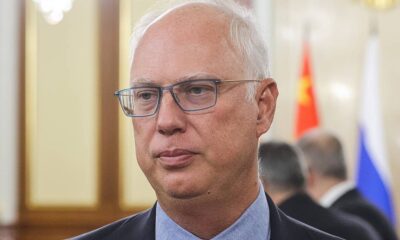Political Issues
Ogun’s Grand Quest For Good Governance -By Adewale Kupoluyi
Despite being tagged as an epicentre, the state government’s sustainable response to the ongoing fight against coronavirus disease (COVID-19) has been impressive.

The rule of law, democracy, and good governance are the hallmarks of a modern state. Laying a proper academic discourse on the subject-matter is Henk Addink, a Professor of Law, Economics, and Governance at the Utrecht University School of Law and the Institute of Constitutional, Administrative Law, and Legal Theory at the University of Utrecht, The Netherlands. In a study titled, “Good governance: Importance in practice, theories, and definitions”, the scholar affirms that good governance manifests within the context of rule of law, democracy, and institutional dimensions that are further broken down into six principles of transparency, properness, participation, effectiveness, accountability, and human rights.
On May 29, 2019, Prince (Dr.) Dapo Abiodun was sworn in on his 59th birthday as the fifth elected governor of Ogun State alongside Engr. (Mrs.) Noimot Salako-Oyedele as Deputy Governor on the platform of the All Progressives Congress (APC). Prince Abiodun, a former Chairman of the Corporate Affairs Commission (CAC) and Member of the Order of the Federal Republic (MFR), is vast in issues bordering on small business empowerment, governance, and development policies. A cursory look at the governor’s vision, mission, manifesto, and action plans for good governance in Ogun State tally with the good governance prescriptions of Prof. Addink.
The governor had promised the people an improvement in the quality of service and capacity building in the public service; development of affordable housing schemes for workers; incentivising law enforcement agencies; promoting collaboration between government and the private sector in the funding and management of the State Security Trust Fund (STF) by complementing the efforts of the Nigeria Police Force (NPF) and sister agencies; the creation of enabling environment for investors; establishment of industrial parks strategically-located in various parts of the state; development of cottage industries under a business assistance scheme in all local councils; faithful implementation of the Universal Basic Education Act for all children of primary and junior secondary ages; and prioritising the welfare of teachers to ensure that best brains are attracted and retained.
The administration’s top priority also cover refurbishing, equipping and upgrading of the existing Primary Health Centres (PHC) to ensure adequate health delivery; creation of centres of excellence in health in each of the three senatorial districts; provision of free healthcare for all children under the age of six years; registering, licensing and training of traditional medical practitioners; creation of farm settlements that would employ state-of-the-art mechanised farm equipment; prioritising the maintenance of existing roads; transforming the state’s tourism potentials into an economically-viable sector; establishment of the entertainment/creative arts and tech hub village; partnering the private sector to provide hydro and gas-powered independent power project tagged ‘light up Ogun’; and the rehabilitation and expansion of the present water supply schemes; and strategic partnership in the construction of boreholes under the ‘water for Ogun scheme’.
Others include the development of oil and gas sector potential by encouraging international investors; resuscitation of the Olokola Deep Seaport project; protection of fundamental rights of the people; sustaining the “Ok’owo Dapo” initiative in conjunction with cooperative initiate and women empowerment programmes; improvement in the financial inclusion for women; focusing on geriatric health education, retirement, and pre-retirement education; making payment of pensions a priority; providing vocational and academic training for disabled persons; as well as the rehabilitation of destitute persons, among others.
Within a short period of one year, the Dapo Abiodun administration comprising mostly competent and experienced lieutenants had matched words with performance. At the inception of the administration, the governor facilitated the “Governor’s Dialogue with the Business Executives” to stimulate the investment climate. The committee for the review of appointments and promotions in the state civil service and enterprises was put in place to bring about transparency, properness, participation, effectiveness, accountability, and reposition the service; there was immediate recruitment of all categories and cadres of healthcare professionals and rehabilitation of the state hospitals, empowerment of 1,000 widows through active involvement of the wife of the governor, Mrs. Bamidele Abiodun.
The “FADAMA Graduate Unemployed Youths Scheme” (FADAMA GUYS) afforded beneficiaries automatic slots and grants from the Ogun State Anchor Borrowers’ programme while unparalleled sports development led the state to win a total of 128 medals at the 2019 National Games Festival. The administration set up the “Chieftaincy Review Committee” that made valuable recommendations for the reversal of the over 75 Baales that were controversially elevated as Coronet Kings by the former administration. Not only that, an Education Summit was held to revitalise and stabilise education in the state. The state also enjoys virile local government administration and checks and balances among the legislative and judicial arms of government.
The State Security Trust Fund was launched as a private sector-driven programme to addresses various security challenges with the procurement of 100 patrol vehicles and 200 motorcycles for the police and other sister agencies, and the sourcing of helicopter from the Federal Government for aerial surveillance. The administration granted executive orders for the establishment of Ogun State Enabling Business Environment Council, Enterprise Development Agency (EDA), promoted public-private partnership, and Micro, Small and Medium Enterprises (MSMEs). The Ogun State Internal Revenue Service (OGIRS) has now been automated to increase internally-generated revenue. The state fiscal projections in 2020 – 2022 are put at N2.99trn, N3.06trn, and N3.14trn respectively with an average projected growth rate of 2.4%. There has been massive rehabilitation of roads by the Ogun State Public Works Agency (OGPWA), as the government plans to give adequate attention to the 236 wards across the state.
Not only that, the government opened a portal to help prospective applicants secure employment in the formal and informal sectors while state-based companies have seized the rare opportunity to outsource for qualified candidates. Despite being tagged as an epicentre, the state government’s sustainable response to the ongoing fight against coronavirus disease (COVID-19) has been impressive. The government had approved the payment of COVID-19 Special Hazard Allowance of 200% increase to all health workers plus Special Risk Allowance and life insurance for personnel treating patients at the state isolation centres.
A pass-mark on the state’s grand quest for good governance is the approval given by the World Bank and other partners in landmark projects like the Ogun State Rural Access and Agricultural Marketing Project (RAAMP), and the Ogun State Economic Transformation Project (OGSTEP), another promising and comprehensive programme that would boost infrastructure, aid food security, provide employment and propel the 44-year-old state into high-income one. No doubt, Ogun State’s yearning for good governance is yielding fruit when viewed along the three dimensions of good governance as espoused by Prof. Addink, viz: enthronement of the rule of law, democracy, and strong institutions in ISEYA (Infrastructure, Social Well-being, Education, Youth Empowerment, and Agriculture et al).
However, there is still room for improvement. For instance, the state should work assiduously at attaining the ambitious targets of the United Nations Sustainable Development Goals (SDGs), which many states in Nigeria failed to meet in 2015 under the Millennium Development Goals (MDGs). Achieving good governance does not lie with the government alone. The art and science of governance require both parties for it to flourish. It demands active participation and scrutiny by the citizens themselves meaning that the people as key stakeholders are expected to be deeply involved in the process by keeping politicians and public administrators on their toes as clearly enunciated in Prof. Addink’s six principles of transparency, properness, participation, effectiveness, accountability, and human rights. As the governor clocks one year in office, the people of the Gateway State can conveniently celebrate success, be optimistic for a brighter future, and cooperatively living the mantra that “it is time for us to build our future together”.
Kupoluyi writes from Federal University of Agriculture, Abeokuta (FUNAAB), Ogun State, @AdewaleKupoluyi










